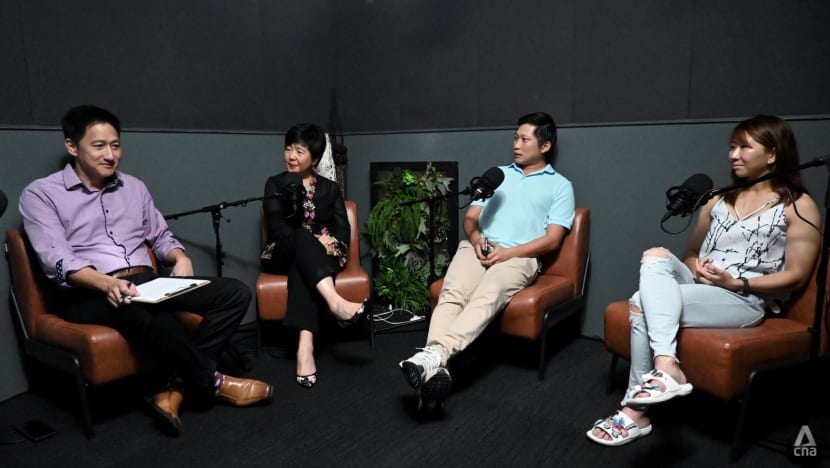Heart of the Matter: 16 months not enough time to find alternatives, say jockey and trainer on Singapore Turf Club closure
For workers in Singapore's small horse-racing industry, the announcement that the 180-year-old Singapore Turf Club will shut down came like a bolt out of the blue. CNA’s Steven Chia sits down with a horse trainer, an apprentice jockey and a HR expert to understand what happened and what their next steps will be.

Race 9’s winning horse number 4 Wecando in action during the race at the Singapore Turf Club on Jun 11, 2023. (Photo: CNA/Jeremy Long)
SINGAPORE: Being a professional jockey was all 29-year-old Singaporean Jerlyn Seow ever wanted after spending years training to be one.
It started with watching Hong Kong shows about horse racing and that soon developed into a passion.
Which explains why when she heard news of the Singapore Turf Club closure while scrolling through social media on Jun 5, she stopped in her tracks.
“I felt it was unbelievable and traumatising,’’ said Ms Seow, an apprentice jockey and guest on the Heart of the Matter podcast.
The government and the Singapore Turf Club had announced that the last race will be held on Oct 5, 2024, and the land returned to the state by March 2027.
The 120 hectares of land in Kranji that is home to the Singapore Racecourse will be redeveloped and used for housing, including public housing.
Horse trainer Jason Ong, 35, said he was also shocked by the news.
Mr Ong said he was in Australia on a horse buying trip. He had heard rumours of a shutdown but by the time he returned to Singapore, the decision was made public.
Listen:
Low Peck Kem, a council member of the Singapore Human Resource Institute, explained in the podcast that with sensitive announcements like business closures, some information is usually kept confidential.
But she added that communicating transparently to stakeholders is equally important.
“Nobody likes a rude shock. And generally, for good practices, very often it has to be kept quite quiet because there (may) be a lot of downstream implications,” she said.
“(But) we try to, in confidence, start to break the news. And the important thing is really to get the employees prepared.”
Neither Mr Ong nor Ms Seow is employed by the Singapore Turf Club.
Mr Ong who runs a private stable and Ms Seow, a jockey-in-training, are considered freelancers who do not come under the direct employment of the STC.
Hence, Ms Low pointed out, they are technically not part of the compensation packages. However, Mr Ong feels they are an integral part of the entire horse racing industry – without them, races cannot happen.
Both say that the period of 16 months leading up to the closure is not nearly enough to dismantle a complex industry.
Said Mr Ong: “Jerlyn only has 16 months to plan her future, I have 16 months to relocate all my staff, find a home for my horses, and to account to my owners. It is going to be a very, very difficult process from now until 2024. There are so many hurdles (ahead).
Ms Low noted that the “right thing to do is to do this with a lot of empathy, and a lot of care, and a lot of respect for the profession”.

Here are some key highlights from the podcast, which covered a wide range of issues surrounding the Turf Club closure:
MANAGING CHANGE
Low Peck Kem: I used to be in the manufacturing industry so when a product line is no longer manufactured here, we manage that transition. We will either reskill or redeploy and if they cannot be redeployed, we offer a retrenchment package.
It’s done with a high level of transparency. We give people options. It’s not their fault, it is not that they are not performing well.
Jason Ong: When the government (says) it wants the land for future generations, that is good. It’s just how the message got passed to us and what problems we are going to face (which were not addressed).
WHERE WILL THE HORSES GO?
Mr Ong: You can only transport eight horses a month to Australia. Malaysia has said it will take 200. (It costs) about S$4,000 to upkeep a horse.
(Horses) are not like cats and dogs. They are (like) athletes, they are racehorses, they do need to be looked after 24/7.
Jerlyn Seow: (When) racing stops next October, the 700 horses are stuck ... How are owners going to pay the bills? The trainers’ staff are going to leave sooner than expected, then there’s no one (at the stables).
Ms Low: The best thing to do is take the next 16 months to plan the transition, not only for the owners, for the trainers, for the jockeys but also for the horses.
I think for humans it is a bit easier to say: 'What are your alternatives?' I think for horses, their fate is kind of decided.
HOW CAN A HORSE TRAINER OR JOCKEY RE-SKILL?
Ms Low: There will be horticulturalists or administrators, they are not so niche and can segue into another industry. (But) clearly for those that are very niche, it is not so easy ... How do you reskill (a horse trainer)? ... If Singapore does not have this job anymore, then you (will) have to look beyond the shores of Singapore.
Ms Seow: I'm a Singaporean. Of course, I would prefer to stay here and continue racing. I have family here and I just got married.
Listen to the full episode here. A new episode of Heart of the Matter drops every Friday. Follow the show on Spotify, Google or Apple podcasts for the latest updates.
















